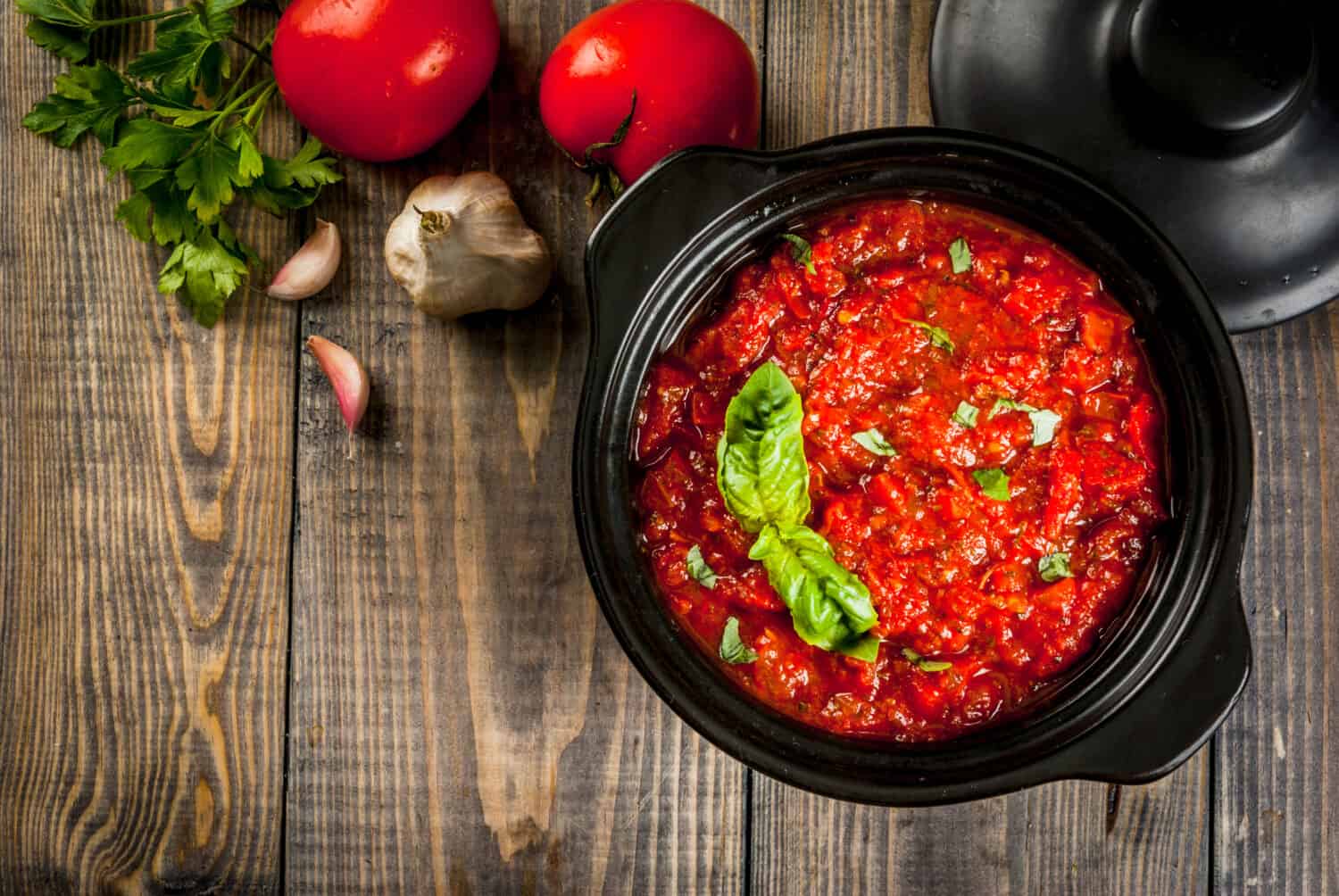Pasta Sauce vs. Marinara, who will win the Battle of the Culinary Giants?
If you are a pasta enthusiast trying to understand the difference between marinara and pasta sauce, tag along! People use marinara sauce and pasta sauce interchangeably as a result of their stark resemblances. Somehow, they might taste and appear exactly the same to some people.
Marinara and pasta sauce are both tomato-based sauces. However, like many other foods, they are not the same. It's easy to become confused while attempting to differentiate between marinara and pasta sauce. Even several manufacturers are still confused between the two, so you might see some brands that produce “marinara pasta sauce.”
Pasta sauce generally has more ingredients, such as vegetables and salt pork. Marinara is also considered a pasta sauce, but it's thinner, simpler, and cooks quickly. But other than that, is there really a world of difference between them?
Pasta Sauce vs. Marinara: What is the Difference?
They are similar in appearance, feel, and even taste that you might consider the same thing when they are not.
Here's an overview of the differences between Pasta Sauce vs. Marinara:
Consistency
Marinara sauce is thinner, but pasta sauce is thicker and lays on top of your pasta meals. However, some marinara sauces are simply too runny. This is because it wasn't simmered thoroughly in most cases. Fresh tomatoes naturally produce an immense amount of liquid when cooking, so marinara's thin consistency is mainly due to the number of tomatoes in the mixture. On the other hand, pasta sauce sometimes contains a roux, a cooked mixture of butter and flour used to make the sauce thicker.
Ingredients
Marinara sauce consists of tomatoes and aromatic spices like onions and garlic. You can also incorporate other flavors and herbs, including basil, rosemary, red pepper flakes, and others, based on your preference.
People typically make pasta sauce by simmering tomatoes, onions, garlic, herbs, spices, some fat (typically preserved pork fat), and flour. People often add ingredients such as carrots, Italian pork sausage, spiced meatballs, or beef as well.
Flavor
Marinara sauce tastes fresh because it's made quickly, usually in about 20 minutes. This means the flavors of the ingredients, like tomatoes, garlic, and onions, don't have as much time to blend together compared to longer-cooked pasta sauces.
Marinara sauce has simpler ingredients, like tomatoes, garlic, onions, and herbs such as basil and oregano. Because of this, these herbs stand out more in the sauce and add to its flavor.
On the other hand, people often cook pasta sauces, especially those with meat, for a longer time to intensify the flavor. When adding meat, such as ground beef or Italian sausage, to the sauce, it creates a rich and complex flavor profile, distinct from the fresh taste of the marinara sauce.
Cooking time
Unlike tomato sauce, marinara is a sauce that cooks fast and only requires around an hour to simmer. Pasta sauce, however, takes some time to make. The flavors can deepen and develop as it simmers for a few hours, making it somehow sweet and thickening its consistency throughout.
Food match
Pasta sauce has a similar flavor and thickness as gravy, and it goes well with meals that have meat. People commonly use it in dishes such as baked lasagna, baked ziti, and chicken parmesan. While people primarily use it as a pasta sauce, it can also serve as an alternative sauce for pizza.
In contrast, marinara sauce has a thinner consistency, which makes it a good match for pizzas and pasta dishes. Its simple flavor and runny consistency don't overpower the other flavors in the dish.
People often serve marinara sauce as a sauce for spaghetti and various types of pasta. They also use it as a dip for cheese sticks, pizza bread, garlic toast, Cacio e Pepe Air-Fried Ravioli, and many other dishes.
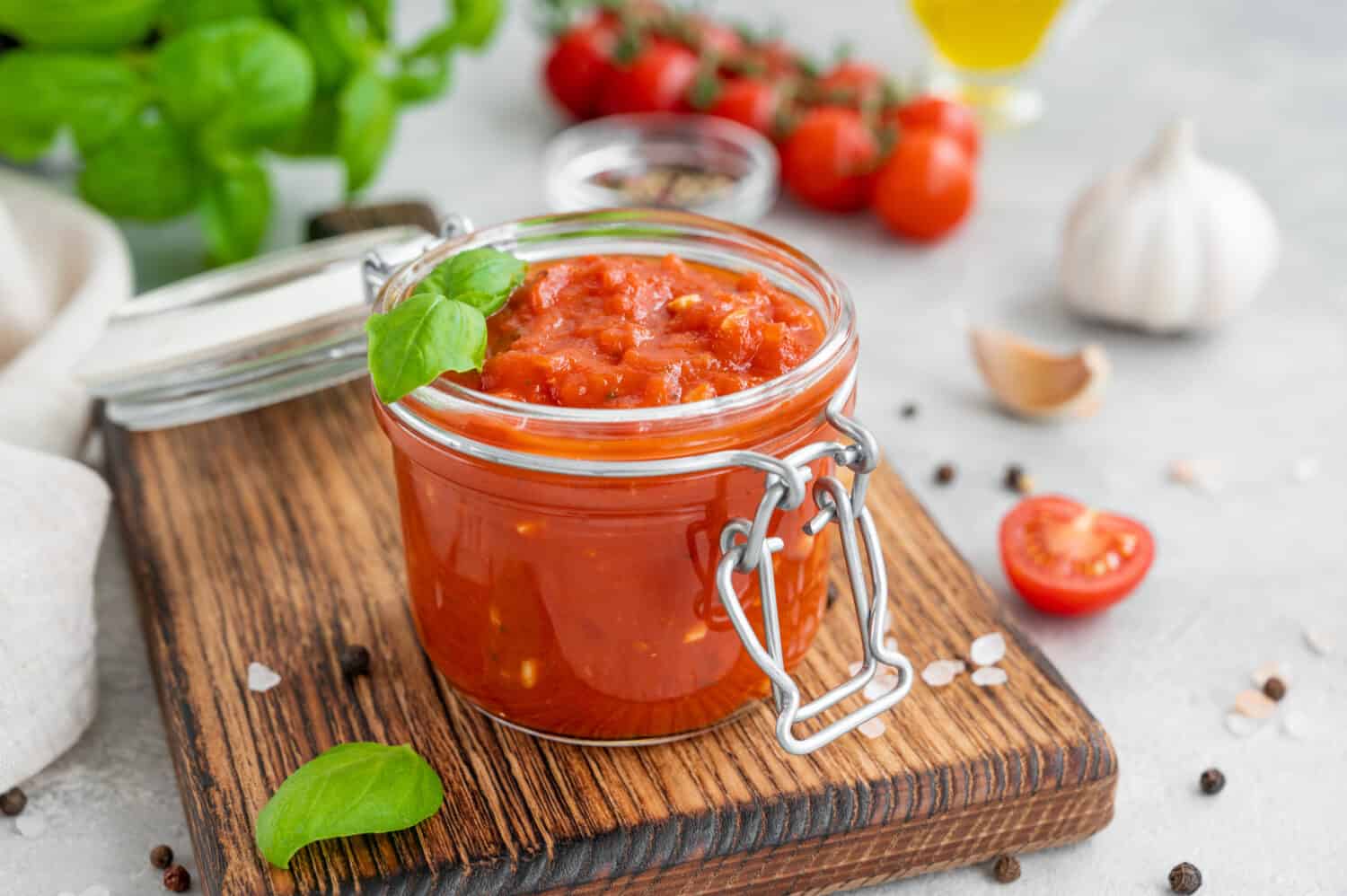
Marinara sauce has low calories and fat.
©irina2511/Shutterstock.com
Pasta Sauce vs. Marinara: Nutritional Value
Pasta sauce and marinara sauce have different nutritional values. Such as pasta sauces, especially those with meat, can have higher calories and fat because they include ingredients like ground beef or sausage. However, it also provides a good amount of protein. The vegetables in pasta sauce, such as tomatoes, onions, and garlic, contain important vitamins and minerals.
On the other hand, marinara sauce generally has lower calories and fat because it usually doesn't have meat. Its primary ingredients are tomatoes, herbs, and seasonings, which provide beneficial antioxidants and vitamins. For individuals looking for a lower-calorie and lower-fat option, marinara sauce is usually a healthier choice.
Both sauces are a good source of lycopene, a powerful antioxidant found in tomatoes that may have various health benefits. However, the overall nutritional profile can vary depending on the specific recipe and ingredients used.
When considering the nutritional value of pasta sauce and marinara sauce, it's important to think about portion sizes and the overall balance of the meal. Pairing either sauce with whole-grain pasta and incorporating a variety of vegetables can contribute to a more nutritious and well-rounded meal.
What is Pasta Sauce?
When we say pasta sauce, this sauce is normally served with pasta and eaten with a wide range of sauce bases. This can either be tomato-based, cream-based, or even a combination of the two. Some examples of this are pesto, bolognese, arabbiata, alfredo, marinara, and more. There certainly aren't any rigid guidelines regarding what simply constitutes pasta sauce.
However, numerous individuals associate pasta sauce with a thicker, more potent, and savory tomato sauce. Americans' pasta sauce is widely known as spaghetti sauce, red sauce, or gravy.
Pasta sauce is usually a tomato-based sauce using crushed tomatoes, passata, and tomato paste blended with different herbs, salt and pepper, garlic, onion, and other seasonings.
What is Marinara?
Despite having a taste quality that is hard to resist, marinara sauce is one of the most basic and common yet delectable sauces in the market. Marinara sauce is an absolute favorite among Italian food enthusiasts since it only requires simple ingredients while providing a rich taste. Many consider it to be more traditional if you compare it to other renowned Italian sauces around the globe.
You can use the marinara sauce as a dipping sauce, so some appetizers and snacks like chips, mozzarella sticks, and fries come with this dip. This will also be a main additive to certain dishes, such as seafood marinara.
Marinara sauce contains more nutrients than any other sort of pasta sauce. It is rich in nutrients and provides several health benefits. This typically comprises garlic, chopped red pepper, and herbs like basil and oregano, giving the sauce its flavor. Marinara can get made with various tomatoes, although plum or paste tomatoes are common.
Can I substitute one with the other?
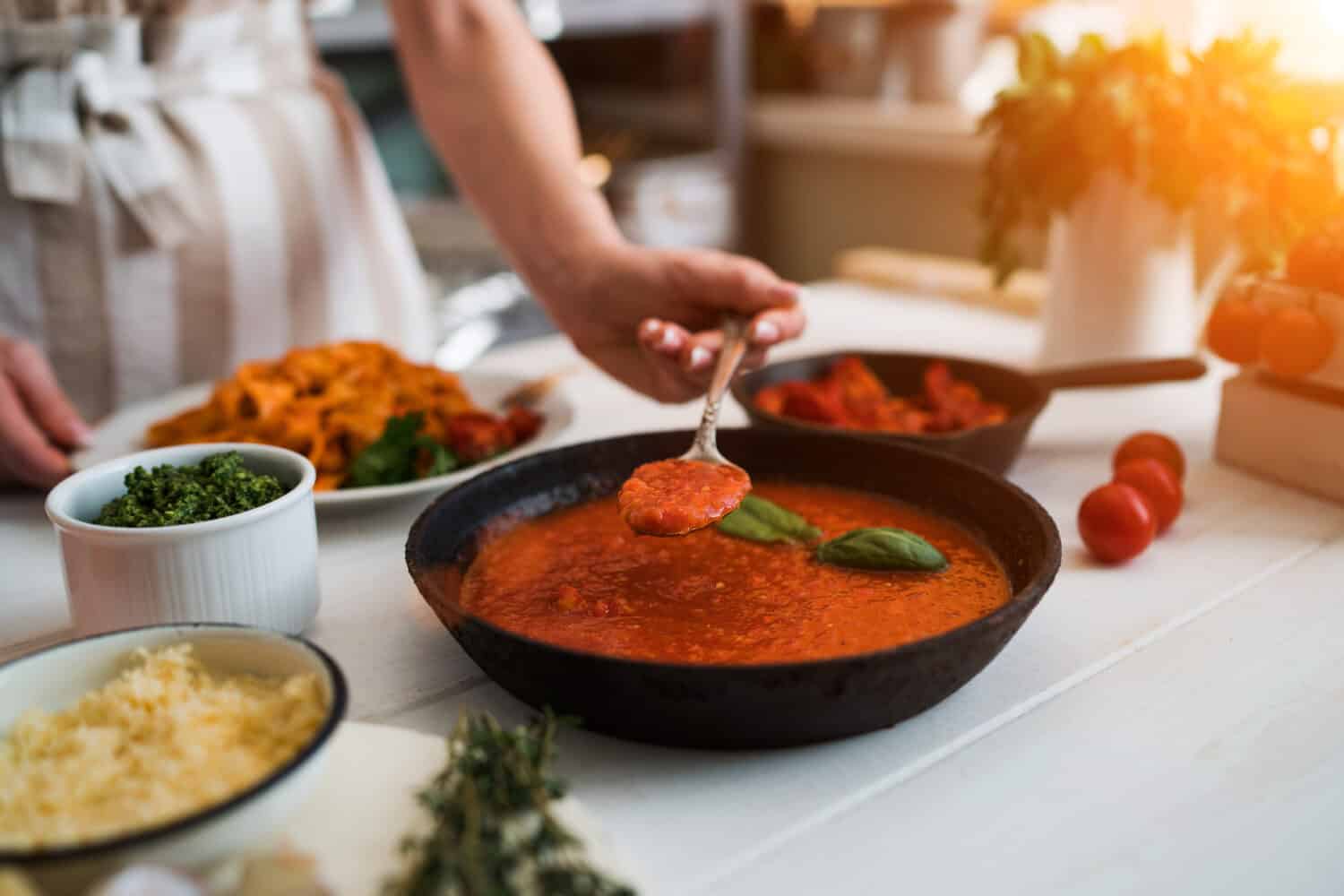
Pasta sauce is usually tomato-based but can be cream-based or a combination.
©ESstock/Shutterstock.com
Marinara and spaghetti sauces share a common ingredient—tomatoes—and people often use them interchangeably. You may use marinara for pasta meals, especially if you are opting for a vegetarian meal. Although pasta sauce, given its heavier and more complicated texture, can overshadow less heavy, simpler meals. Given its light flavor, we do not recommend marinara for drowning meats or stuffing lasagnas.
Healthy Substitutes for Pasta Sauce
Here are several pasta sauce substitutes that you can try to enhance the overall taste of your meals.
Romesco
The flavor of this Spain-based sauce is pleasantly sweet and bright, including garlic and smokey flavors, as well as an added hint of spice. It's also created using simple ingredients such as red bell peppers, garlic, tomatoes, and almonds. This provides enough burst flavor to just about every meal.
Roasted Red Pepper Sauce
Bell peppers are also used as a substitute for tomato sauce. Red bell peppers are rich in vitamin C and have the greatest nutrients of any kind of pepper. The flavor profiles are unusual but pleasant, rich, creamy, tangy, and smoky-sweet! And because of its incredible adaptability, this sauce is added to spice up any dish, any day of the week.
Ajvar
Ajvar's sweet, acidic, smokey fragrance makes it an excellent no-tomato replacement for pasta sauce. This traditional Serbian and Balkan sauce is produced using roasted red peppers and eggplant, which is very comforting and delicious. It goes well with nearly every meat, appetizer, cheese, and pizza.
Healthy Alternatives for Marinara
There are alternatives if you are out of tomato sauce or want to try something new. You may use these fantastic marinara substitutes to level up your pasta and pizza game.
Most of the ingredients used in these are already available at home. Thus, all that's required is some patience and work, and your marinara sauce alternative will be done in a snap.
Beets and Carrots Puree
Beets and carrots, two healthy vegetables with several health advantages, are blended to make a delicious pasta sauce substitute. After blending, you can add water to achieve the consistency you want. Particular dishes differ, but most involve sauteing and simmering the veggies with fresh lemon juice or vinegar to add tanginess and onions, along with various herbs to mimic a more typical pasta sauce.
Caponata
Caponata's primary elements are eggplants, onions, olive oil, vinegar, and a certain kind of tomato good, whether tomato-based sauce, fresh tomatoes, or both. Pistachio nuts, raisins, capers, olives, celery, basil, peppers, onions, garlic, parsley, and/or oregano can also be added.
Arrabbiata Sauce
Arrabbiata Sauce is incredibly simple to create, using just six key ingredients, and is certain to take your pasta evenings to the next level. This dish is a mixture of cloves of garlic, tomatoes, and dried red chili peppers that have been sautéed in olive oil. This sauce originated in Rome.
Which is healthier?
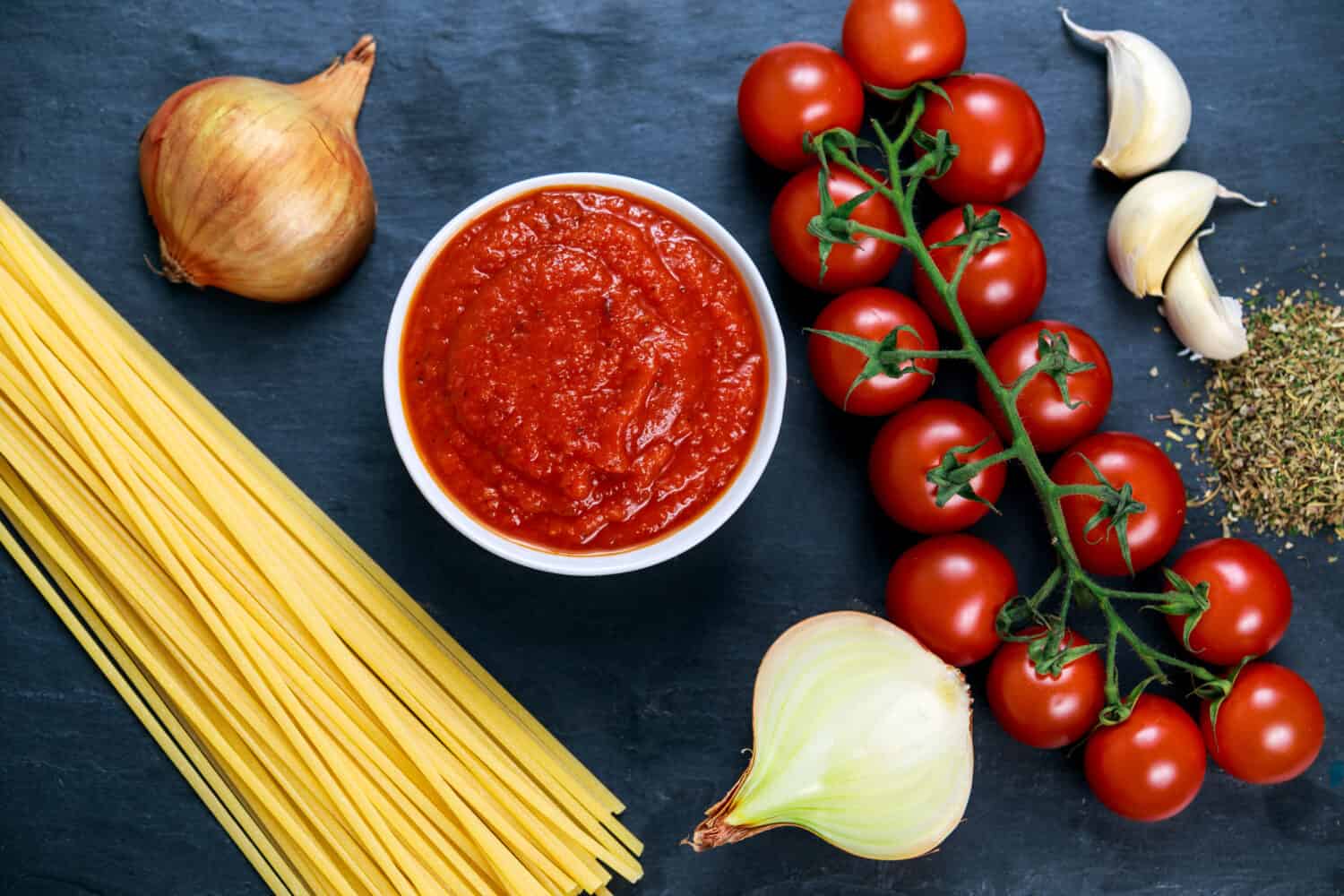
Marinara sauce has high levels of vitamins and minerals, making it a healthy sauce.
©DronG/Shutterstock.com
Marinara sauce has higher levels of vitamins and minerals, making it healthier. Because tomatoes and spices make up most of the marinara sauce in the list of ingredients, it is healthier than traditional tomato-based pasta sauce.
Pasta Sauce Recipies
PrintCheesy Stuffed Meatballs and Spaghetti
- Total Time: 30 minutes
Ingredients
- 1 pound ground beef
- 1/2 cup Italian seasoned dry bread crumbs
- 1 teaspoon garlic powder
- 1 egg
- 2 ounces mozzarella string cheese sticks, cut into 12 (1/2-inch) slices
- 26 ounces (1 jar) Italian style pasta sauce
- 8 ounces spaghetti, cooked and drained
Instructions
1. In medium bowl, combine ground beef, bread crumbs, garlic powder and egg; shape into 12 meatballs.
2. Press 1 cheese slice into each meatball, enclosing completely.
3. In 3-quart saucepan, bring pasta sauce to a boil over medium-high heat. Gently stir in uncooked meatballs.
4. Reduce heat to low and simmer covered, stirring occasionally, 20 minutes or until meatballs are done. Serve over hot spaghetti.
- Prep Time: 10 minutes
- Cook Time: 20 minutes
Final Thoughts
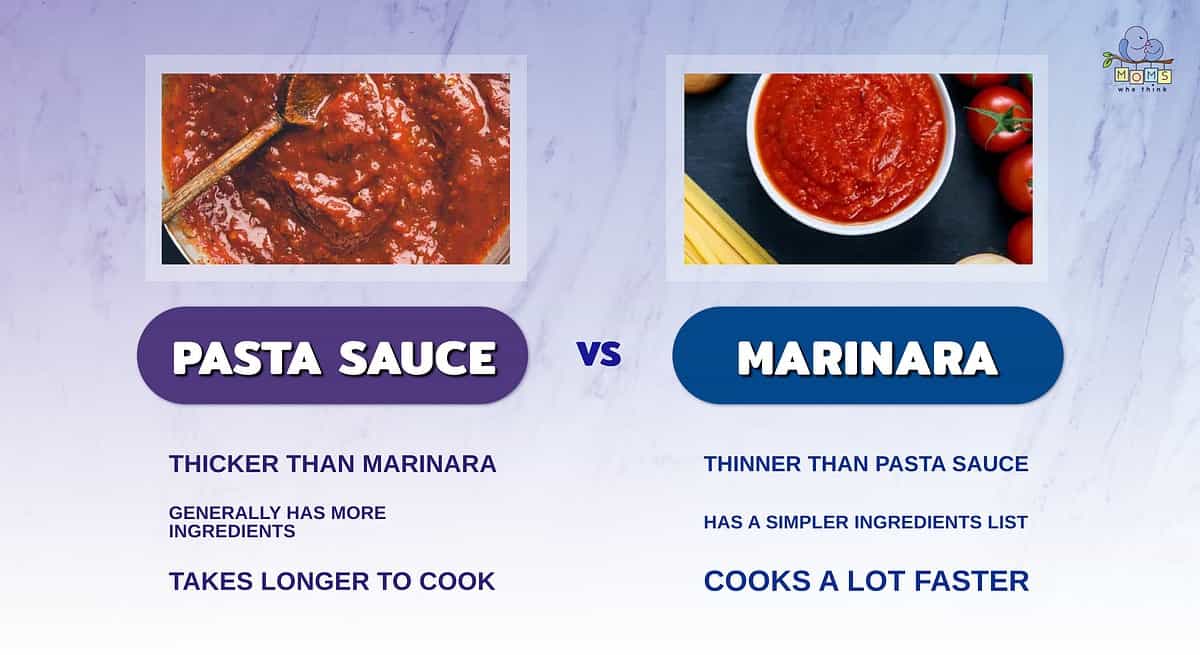
- Pasta sauce is thicker than marinara, making it easier to pour over food such as pasta. Some people may find marinara too runny for their taste.
- Marinara has a simpler ingredients list, making it generally cheaper to make than pasta sauce.
- Pasta sauce takes a while to cook, while marinara can generally be prepared fairly quickly. If you need a tomato sauce in a pinch, marinara is the way to go.
Pasta sauce has a more powerful and distinct flavor owing to its lengthy ingredient list. Marinara sauce is typically meat-free (unlike some pasta sauces), making its consistency lighter and thinner. Both sauces use just a handful of the same ingredients, such as tomatoes, olive oil, garlic, herbs, and spices. One with just a few more ingredients.
If you want to increase your calorie or fat intake, use spaghetti sauce. If you want a lighter, veggie-based sauce, marinara is your best choice!
The techniques and cooking concepts underpinning these sauces will help you determine what you should use depending on your goal. Several dishes work with either marinara or tomato sauce, so context also matters when choosing between the two.
The image featured at the top of this post is ©Rimma Bondarenko/Shutterstock.com
